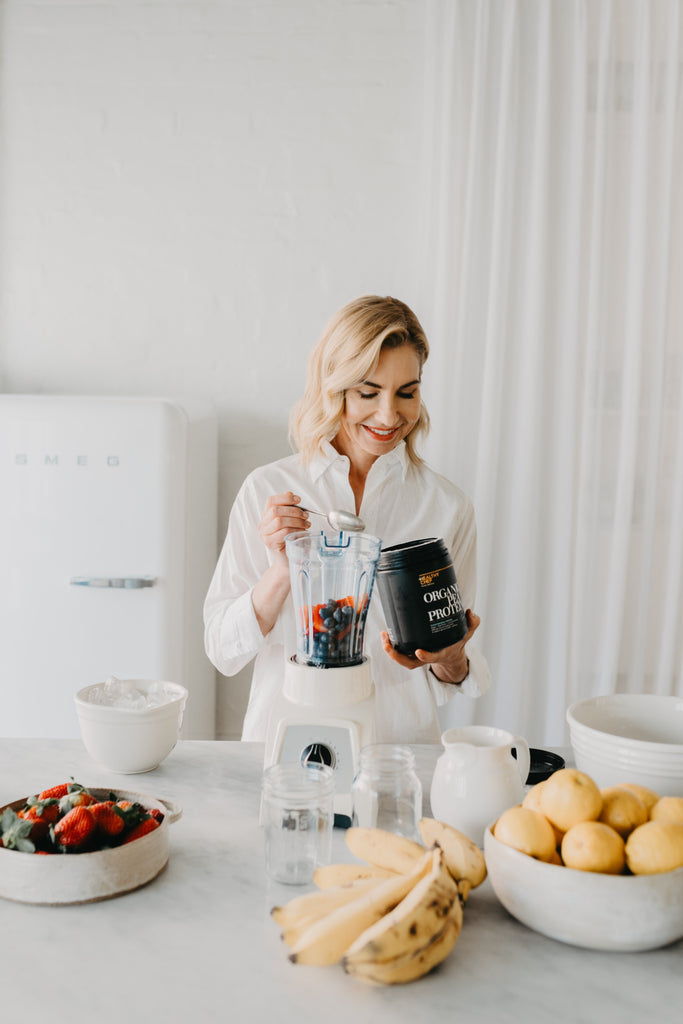Whether or not you are vegan or vegetarian, you can bump your protein intake without having to rely mostly on animal-based protein sources.
Relying less on animal products can be great step in increasing your intake of more nutrient-rich wholefoods and it can also keep your skin glowing, support a healthy weight, and prevent the onset of chronic disease.
1 - QUINOA
Most grains contain a small amount of protein, but quinoa—technically a seed—is unique in that it contains more than 8 grams of protein per cup, including all nine essential amino acids that the body needs for growth and repair.
What I love about quinoa is that it’s incredibly versatile and can be added into salads and soups and used in breads, such as my Gluten-Free Bread, or in gluten-free porridge.
2 - NUTS + NUT BUTTERS
I use nuts most days to boost the nutritional profile and protein level of my meals. I love sprinkling roasted omega-3 rich walnuts over my salad or adding a spoonful of almond butter into my morning banana smoothie. Almonds in particular are rich in protein, magnesium, potassium, copper, zinc, folic acid, calcium and antioxidants such as vitamin E.
For a super-quick nut milk I blend 1 spoonful of cashew or almond butter with 1 cup of water to blend into my protein rich breakfast smoothies.
3 - GREEN PEAS
Peas are a great vegetable source of protein that helps to fuel and repair your body, build lean muscle and support your immune system. Peas are also high in fibre and great for weight control because they are low GI, and help keep blood sugars stable so you feel fuller for longer. One cup of green peas contains around 8 grams of protein—about the same as a cup of dairy milk!
A few of my favourite meat-free meals using peas include my Green Garden Salad, Green Pea + Spinach Risotto or Green Pea Fritters. I also use Healthy Chef Pea Protein in my morning smoothies which keeps me going right up until lunchtime.
4 - ORGANIC PEA PROTEIN + BODY SHAPING PROTEIN
I LOVE MY PEA PROTEIN! It was the very first product that I designed when I launched the Healthy Chef Functional Food Range. Including a plant based protein to add into your breakfast smoothies makes the meal complete and will help support your overall health and wellbeing.
Certified Organic - Sugar Free - No Bloating - Lactose free – Entirely Raw + Soy Free. Perfect for the whole family. You can find out more about Organic Pea Protein here....
Healthy Chef Body Shaping Protein is also a great plant-based protein powder that comes in 14 individual sized sachets. I usually pop them in my hand bag, gym bag or suitcase when travelling.
Pea Protein is ideal for improving skin health, digestive health, a strong immune system, sports performance + sustained weight loss. The perfect addition to your smoothies and help your body nourish and refuel.
5 - BEANS
There are many different varieties of beans—black, white, pinto, heirloom, mung beans —but one thing they all have in common is their high amounts of protein.
Two cups of kidney beans, for example, contain about 26 grams. Personally, I love to use mung beans as I often make my Detox Mung Bean Risotto. Green mung beans are rich in complete plant protein, fibre, antioxidants and phytonutrients.
While some people experience gas or bloating from eating beans, soaking your beans then rinsing them will minimise the effects. Mung beans are also low FODMAP and considered one of the easiest beans to digest. Just remember to soak them first before you cook.
6 - SEEDS
Pumpkin seeds, sunflower seeds, hemp seeds, chia seeds, sesame seeds - they are all wonderful and are rich in minerals, antioxidants and protein. Seeds are anti-inflammatory which is also why they are extensively used in detoxification diets as a protein and mineral supplement. The high mineral and protein content of seeds, especially pumpkin seeds also supports collagen production for healthy skin.
A cup of pumpkin seeds contains 12 grams of protein. I use them mainly for making Pumpkin Seed Milk for a great anti-inflammatory dairy-free milk. I also add seeds to muesli, sprinkle them over salads or avocado toast, or add them into my protein rich breakfast smoothies.
7 - TEMPEH + TOFU
We love our tempeh at HCHQ. It's a wonderful fermented organic soybean product that's rich in probiotics and isoflavones, as well as protein - perfect if you're menopausal. A 100 g serve of tempeh has about 18g of protein. The fermentation process has already converted some of the protein into amino acids, so your digestive system doesn't have to work so hard with tempeh.
Tempeh is low FODMAP and kind to sensitive digestive systems... just like mine.

 Need help finding the right product for you?
Need help finding the right product for you?
